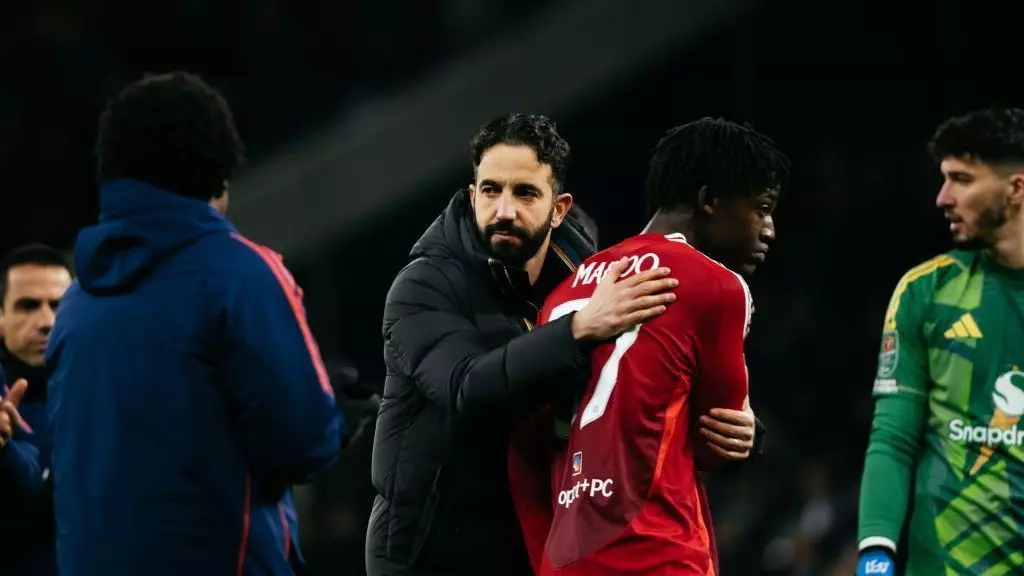In the aftermath of a thrilling yet disappointing cup exit for Manchester United against Tottenham Hotspur, the head coach, Ruben Amorim, faces scrutiny over his controversial squad selection—specifically, the omission of star player Marcus Rashford. The resilience and strategic nuances of Amorim’s decisions have ignited debates among fans and pundits alike, particularly as the team fell to Spurs with a narrow 4-3 defeat in the Carabao Cup quarterfinals.
Gutsy Decisions: The Rashford Conundrum
Amorim’s choices revolve around his interpretation of what constitutes the best interests of the team. In a recent interview, Rashford expressed dissatisfaction, hinting at a desire to leave Manchester United after being sidelined for two consecutive matches. Critics have questioned Amorim’s judgment in excluding a player of Rashford’s caliber, especially during a pivotal knockout stage of a tournament. When pressed about whether the outcome alter his approach, Amorim remained resolute, claiming that all selections are aimed at fostering the best environment for team performance. “It’s never a mistake,” he stated, reflecting a mindset that prioritizes collective goals over individual aspirations.
To understand Amorim’s perspective, it’s imperative to consider the pressures that come with managing a high-profile club. Coaches are often faced with the dilemma of balancing player egos with team dynamics. In this case, Amorim’s decision may resonate with a broader strategy to cultivate a tightly-knit squad discipline, a trait sometimes conspicuously absent in star-studded lineups. While critics might perceive this exclusion as mismanagement, the coaching staff might regard it as a necessary step toward addressing internal challenges.
The match itself showcased a rollercoaster of performances, particularly from the goalkeepers. United’s second-choice goalkeeper Altay Bayindir, who was chosen over current first-choice André Onana, faced scrutiny after making crucial errors that contributed to Tottenham’s goal tally. Meanwhile, Spurs’ Fraser Forster, despite being generally reliable, had a night to forget, misjudging critical moments that allowed United to briefly rally back into the game. The sheer intensity of these moments showcased the frailty of goalkeeping under pressure, where a single mistake can ripple through team morale.
Despite their initial struggles, United showed remarkable tenacity, clawing back from a significant 3-0 deficit to 3-2. Amorim’s acknowledgment of the team’s effort speaks volumes about the resilience he aims to instill within his players. The disappointment setting in after conceding a fourth goal indicates that, while hope was restored briefly, fragility lingered in the atmosphere. Amorim’s frustration at conceding during a critical eight-minute stretch of the second half exemplifies the razor-thin margins that often dictate success in competitive football.
The aftermath of the defeat bears heavy implications for Manchester United’s trajectory this season. Amorim’s firm stance on maintaining high standards could yield benefits in the long run, but it places him under immediate scrutiny as fans cling to the prospects of a successful season. As for Tottenham, they will relish their victory, eagerly setting sights on their semifinal encounter against Liverpool—an opportunity for redemption and glory.
Critically, Amorim’s decision-making process, while justified in his eyes, will need to evolve in subsequent matches. Will he continue to implement stringent discipline, or will he adapt to include players like Rashford, whose contributions can pivot games? The choices made by coaches in moments of adversity often define their tenure and set the narrative for what is perceived as success or failure within their respective clubs.
The match against Tottenham was about more than just a cup defeat; it posed fundamental questions regarding team cohesion, player management, and strategic foresight. As Amorim navigates through this challenging chapter, the need for clear direction and galvanization of player spirits becomes paramount. The road ahead for Manchester United will demand both clarity and adaptability—a balancing act that could define Amorim’s legacy.


Leave a Reply